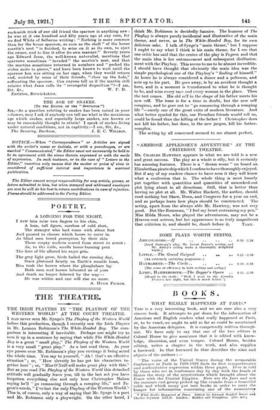THE THEATRE,
THE IRISH PLAYERS IN "THE PLAYBOY OF THE
WESTERN WORLD" AT THE COURT THEATRE. I HAD never seen Mr. Synge's The Playboy of the Western World before this production, though I recently saw the Irish Players in Mr. Lerumx Robinson's The White-Headed Boy. The com- parison is interesting if inevitable. Perhaps one might try to sum it up in a sentence by saying that while The White-Headed Boy is a great "small play," The Playboy of the Western World is a very small "great play." As a test read them. As your eye passes over Mr. Robinson's play you envisage it being acted the whole time. You say to yourself, " Ah ! that's an effective situation"; or, "How cleverly he has got his characters to- gether here" ; or, "Miss O'Neill will make great play with this." But as you read The Playboy of the Western World this detached attitude will gradually leave you, till in the last act you have forgotten everything else and only hear Christopher Mahon saying he'll "go romancing through a romping life," and Pe- geen's words, "I've lost the only Playboy of the Western World:, This is, of course, only a way of saying that Mr. Synge is a poet and Mr. Robinson only a playwright. On the other hand, I think Mr. Robinson is decidedly funnier. The humour of The Playboy is always purely incidental and illustrative of the main theme, and never, as in The White-Headed Boy, for its own delicious sake. I talk of Synge's "main theme," but I suppose I ought to say what I think is his main theme, for I see that one critic has said that the centre of the play is Pegeen and that the main idea is her entrancement and subsequent disillusion- ment with the Playboy. This seems to me to be almost incredible.. I should have thought that obviously the main idea was the simple psychological one of the Playboy's "finding of himself." At home he is always considered a dunce and a poltroon, and acts up to his part. He goes away, is by an accident thought a hero, and in a moment is transformed to what he is thought to be, and wins every race and every woman in the place. Then the test comes. His old self in the shape of his father meets his new self. The issue is for a time in doubt, but the new self conquers, and he goes out to "go romancing through a romping life "—surely one of the great exits of modern literature. And what better symbol for this, our Freudian friends would tell us, could be found than the killing of the father ? Christopher does not kill his father, but does, in the new jargon, kill his father- complex.
The acting by all concerned seemed to me almost perfect.


































 Previous page
Previous page